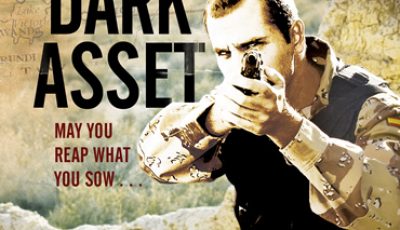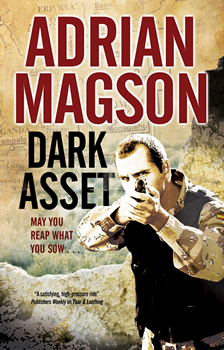

Dark Asset by Adrian Magson
 It’s back to Somalia (see The Watchman) for deep cover specialist Marc Portman. Hired this time by a French intelligence agency, he’s sent in undercover to provide back-up for one of their officers trying to recover a hard drive from one of the most dangerous cities on the planet – Mogadishu.
It’s back to Somalia (see The Watchman) for deep cover specialist Marc Portman. Hired this time by a French intelligence agency, he’s sent in undercover to provide back-up for one of their officers trying to recover a hard drive from one of the most dangerous cities on the planet – Mogadishu.
What they haven’t told Portman is that the device holds a record of top-secret negotiations for oil drilling worth billions, talks held between two leading western nations… and a hard-line terrorist organisation responsible for killing thousands of innocent people. If the recordings should get into the public domain, they’re capable of toppling two governments and ruining many reputations and careers, which is why it’s vital for the hard drive to be retrieved at all costs.
But while Portman and his French protectee are working hard to complete their task in already extreme circumstances, the decision is made to abandon the negotiations and close down all contacts with the terrorist organisation as if the talks never took place.
To reinforce this decision, an international team of former Foreign Legionnaires and ex-US special forces operatives is despatched to make sure that all records of the talks are buried for good. And that includes wiping out any non-affiliated ‘assets’ on the ground in Somalia.
Which puts Portman at the very top of the hit list.
Unfortunately for them, Portman doesn’t silence easily, and does what he does best, which is to fight back.
Author Adrian Magson recently took some time out of his busy schedule to discuss his latest thriller with The Big Thrill:
What do you hope readers will take away from this book?
First, I hope they will find an intriguing story well told; second, that they are entertained by learning a little more about my character, Marc Portman, and the situations in which he finds himself thrust by outside powers.
How does this book make a contribution to the genre?
It was my intention to show that dark forces do not exist only in the world of terrorism; that government and big business (in this case the oil industry), also play a part which should frighten the dickens out of most of us if we give it a moment’s thought. In addition, the spy genre is made up of characters who are quite capable of playing different games to suit their own aims, and that the role of a ‘dark asset’ is at best vague and, in the end, often expendable.
Was there anything new you discovered, or surprised you, as you wrote this book?
I was aware of the coalition assets in Djibouti, in particular Camp Lemmonier, which began life under the French Foreign Legion, who have long operated in that part of North Africa. But that camp has since transformed into a vast base for thousands of US forces personnel, in particular Special Ops groups and for conducting drone strikes and surveillance operations in the region. In addition, Djibouti has now attracted considerable forces from other nations.
No spoilers, but what can you tell us about your book that we won’t find in the jacket copy or the PR material?
In spite of threats from all sides, including terrorists and criminal gangs in Mogadishu, Somalia (where he has to go undercover to recover a vitally important hard drive), and even from those he has to trust, there are several instances where he comes into contact with innocent outsiders who have nothing to do with the circumstances, but who are affected by them, as if so often the case in the real world. These are the ones that show that Portman isn’t simply a robot, primed and pointed to accomplish a mission and nothing else.
What authors or books have influenced your career as a writer, and why?
A whole raft, from early introductions aged 8 to Leslie Charteris and Louis L’Amour (story-telling that captured me completely) to Alistair Maclean and Frederick Forsyth, (action and excitement with real backdrops), Robert Crais (touches of humour among the tension), John Sandford (a vivid sense of ‘place’), Lee Child (the rolling, non-stop story), and many others who simply made me want to be – and keep being – a writer.
*****
 Hailed by the Daily Mail as ‘a classic crime star in the making’, Adrian Magson is the author of 22 books, the latest of which is Dark Asset, (pub Severn House – 1 January 2017.
Hailed by the Daily Mail as ‘a classic crime star in the making’, Adrian Magson is the author of 22 books, the latest of which is Dark Asset, (pub Severn House – 1 January 2017.
This is the fourth book in the Marc Portman spy thriller ‘Watchman’ series, prompting one reviewer to comment:” the most explosive opening chapters I have read in a long time. Give this man a Bond film script to play with!”
Portman is a protection specialist hired to watch over spies and other operatives in hazardous situations. The difference between him and other protection experts is, the people he’s looking after rarely know he’s there… unless he needs to step in and take extreme measures to get them out of trouble.
Adrian’s other current series features private contractors Ruth Gonzales and Andy Vaslik, who work for the Cruxys organisation and search for missing people. His latest title, The Bid (pub Midnight Ink – January 8 2017) follows on from The Locker (January 2016) – “Magson takes the suburban thriller overseas and gives it a good twist. Readers ……will happily get lost in the nightmare presented here.” (Booklist Reviews)
His previous series are built around Harry Tate, ex-soldier and MI5 officer: ‘fast-paced, with more twists and turns than a high-octane roller coaster’. (New York Journal of Books); Inspector Lucas Rocco (set in 1960s’ Picardie in France): ‘Deserves to be ranked with the best.’ – (Daily Mail); ‘captures perfectly the rural atmosphere of France…. a brilliant debut…’ (Books Monthly): & Gavin & Palmer (investigative reporter Riley Gavin & ex-Military Policeman Frank Palmer) ‘Gritty and fast-paced detecting of the traditional kind, with a welcome injection of realism.’ (The Guardian).
Adrian also has countless short stories and articles in national and international magazines to his name, plus a writers’ help book: Write On – the Writer’s Help Book (Accent Press).
To learn more about Adrian, please visit his website and his blog.
- LAST GIRL MISSING with K.L. Murphy - July 25, 2024
- CHILD OF DUST with Yigal Zur - July 25, 2024
- THE RAVENWOOD CONSPIRACY with Michael Siverling - July 19, 2024
